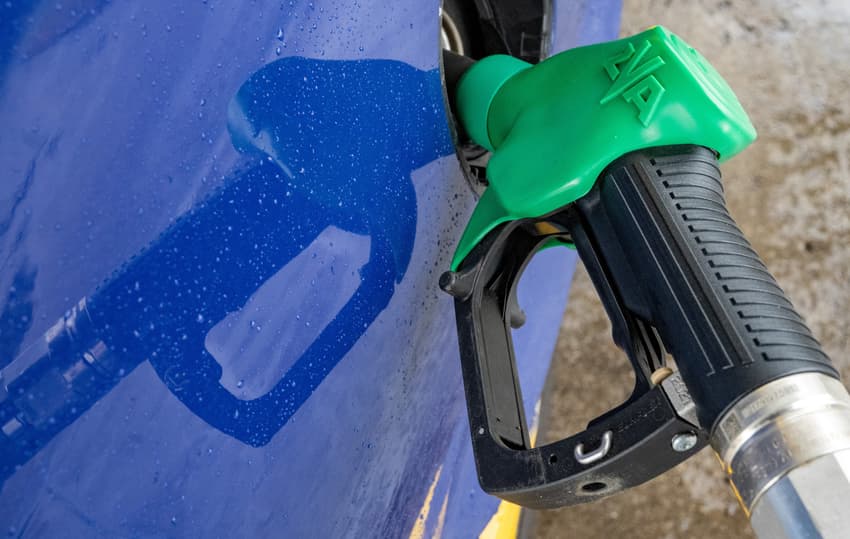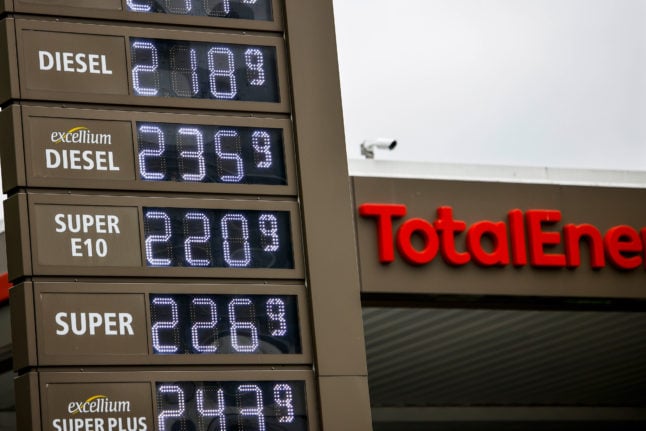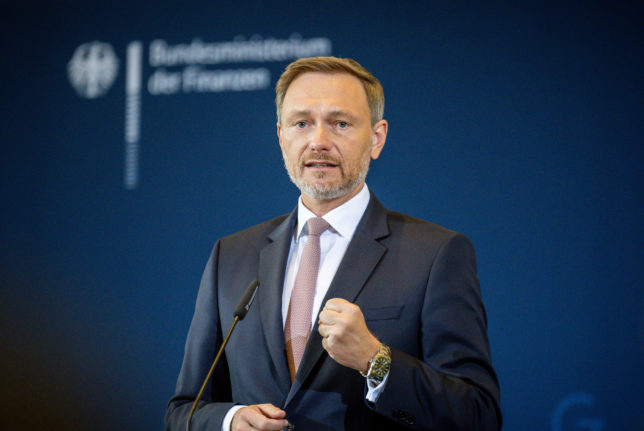Why are fuel prices soaring in Germany this week?

The price of crude oil has sunk at several points in the past few weeks. So why are drivers in Germany still getting a shock at the petrol pump?
What's going on?
Petrol and diesel prices are soaring again in Germany, with dramatic price rises even in the last few days.
Since Wednesday, the price of a litre of E10 petrol has risen from €2.07 to €2.13 nationwide, while the price of diesel shot up from €1.98 per litre to €2.05 per litre over the same period.
The sudden price shock at the end of the month reflects a trend that's been going on throughout the month of May.
In Berlin, for instance, petrol prices rose from around €2.01 per litre to as high as €2.20 per litre at certain petrol stations in the capital.
Similar price hikes were seen in Munich and Cologne, where drivers were asked to shell out around €2 for a litre of petrol at the start of the month, but were paying between €2.13 and €2.20 per litre by the 30th.
Why is that a big deal?
It's true that people are very used to seeing volatile energy prices right now - particularly with supply issues and the ongoing war in Ukraine.
This time, however, the sudden price jumps have raised some eyebrows.
That's because, in recent weeks, the price of a barrel of crude oil has actually been sinking.
As the motorists' association ADAC points out, crude oil currently costs $113 a barrel and could potentially head towards the previous highs of $125 that were seen in March.
However, prices have also dropped below $100 at some points in the past two weeks, while petrol prices have continued to go up regardless.
At the same time, the euro has been strengthening against the dollar, which generally makes it cheaper for EU countries to buy crude oil since the price of crude oil is set in dollars.
According to ADAC, this means there is "plenty of potential" for prices to go down.
So why are prices still on the up?
That's the million euro question, and nobody (aside from the fuel companies) can say exactly what's behind it.
Nevertheless, there's speculation that it could be due to the fact that the government is about to slash taxes on fuel for a limited period.
As part of its energy relief package, the traffic-light coalition of the Social Democrats (SPD), Greens and Free Democrats (FDP) will cut energy taxes on fuel to the minimum rate that's allowed under EU law.
Like the €9 ticket for public transport users, the tax cut on fuel will run from June 1st to August 31st before returning to normal in September.
The government estimates that drivers could save as much as 14 cents on every litre of diesel or 30 cents on every litre of petrol through its reduced tax rate. But that estimate relies on fuel companies steering clear of the temptation to profit from the measure.
READ ALSO: When will Germany’s fuel tax cut come into force?

Signs display current prices at Berlin petrol station on May 29th. Photo: picture alliance/dpa | Carsten Koall
Unfortunately for car owners, it appears that fuel companies are not as altruistic as the government hopes they are: in fact, experts believe that these firms could be hiking their prices now in order to benefit more from the tax cut when it comes into force on Wednesday.
This would compound the billions of profits that they're already reaping in since the outbreak of war in Ukraine. With energy prices skyrocketing, major oil concerns like BP, Shell and Total are currently seeing record turnover.
However, Germany's Fuel and Energy Trade Association has rejected the idea that fuel companies are cashing in on the tax cut.
"There have been increasing shortages in the global petrol market for about two weeks," Adrian Willig, the association's chief executive, told Tagesspiegel. "This was triggered by the USA, where the start of the summer driving season is hitting low stocks in refineries and tank farms."
This has had an impact on global fuel prices, he said, including in Germany.
READ ALSO: KEY POINTS: Germany’s proposals for future energy price relief
Are drivers going to see any relief at the petrol pump?
That's debatable - partly because the market is dominated by just a handful of companies and the way prices are set is far from transparent.
However, Finance Minister Christian Lindner (FDP), who spearheaded the €3.15 billion relief measure, believes that drivers will still see a difference when refilling their tanks.
Though there's no obligation for companies to pass on the tax relief, the government has said it expects them to do so and has warned that the Federal Cartel Office will be monitoring how fuel companies set their prices from June.
"We will not leave the people who depend on their cars alone," Linder wrote on Twitter. "The state should not profit from high fuel prices. It is now up to the Cartel Office and others to ensure that the #fuelrebate reaches the people!"
Despite these high hopes, the Finance Ministry has told consumers not to expect a dramatic drop in prices straight away, since certain petrol stations may have already bought their petrol and diesel reserves in May.

Finance Minister Christian Lindner (FDP) speaks at a press conference on May 30th in Berlin. Photo: picture alliance/dpa | Michael Kappeler
Willig from the Fuel and Energy Association also believes that fierce competition between petrol stations brands will drive prices down over summer.
But some businesses and households are still worried that they won't see the savings the hoped they would.
Speaking to Bild am Sonntag, German logistics companies complained about the uncertainty they were facing and said they were having to make layoffs in the wake of the fuel crisis.
"It would be a catastrophe if the fuel rebate were to fizzle out," Dirk Engelhardt, chief executive of the Federal Association of Freight Transport and Logistics, explained. "Relying on the oil multinationals to make diesel cheaper is simply too little and really makes us angry."
However, the sudden spike in prices could suggest that fuel companies want the drop in prices to be noticeable to consumers when it does happen - but are still hoping to make some profit on the back of the tax cut.
This appears to be the view of ADAC, who plan to monitor fuel prices closely once the relief measure comes into force.
"We expect the tax reduction to be passed on in full to consumers as of June 1st," they said. "Moreover, given the inflated prices, there is plenty of potential for reductions."
READ ALSO: Who benefits the most – and least – from Germany’s energy relief measures?
Vocabulary
fizzle out - verpuffen
bottlenecks - (die) Engpässe
tax cut - (die) Steuersenkung
cash in - abkassieren
We’re aiming to help our readers improve their German by translating vocabulary from some of our news stories. Did you find this article useful? Let us know.
Comments (2)
See Also
What's going on?
Petrol and diesel prices are soaring again in Germany, with dramatic price rises even in the last few days.
Since Wednesday, the price of a litre of E10 petrol has risen from €2.07 to €2.13 nationwide, while the price of diesel shot up from €1.98 per litre to €2.05 per litre over the same period.
The sudden price shock at the end of the month reflects a trend that's been going on throughout the month of May.
In Berlin, for instance, petrol prices rose from around €2.01 per litre to as high as €2.20 per litre at certain petrol stations in the capital.
Similar price hikes were seen in Munich and Cologne, where drivers were asked to shell out around €2 for a litre of petrol at the start of the month, but were paying between €2.13 and €2.20 per litre by the 30th.
Why is that a big deal?
It's true that people are very used to seeing volatile energy prices right now - particularly with supply issues and the ongoing war in Ukraine.
This time, however, the sudden price jumps have raised some eyebrows.
That's because, in recent weeks, the price of a barrel of crude oil has actually been sinking.
As the motorists' association ADAC points out, crude oil currently costs $113 a barrel and could potentially head towards the previous highs of $125 that were seen in March.
However, prices have also dropped below $100 at some points in the past two weeks, while petrol prices have continued to go up regardless.
At the same time, the euro has been strengthening against the dollar, which generally makes it cheaper for EU countries to buy crude oil since the price of crude oil is set in dollars.
According to ADAC, this means there is "plenty of potential" for prices to go down.
So why are prices still on the up?
That's the million euro question, and nobody (aside from the fuel companies) can say exactly what's behind it.
Nevertheless, there's speculation that it could be due to the fact that the government is about to slash taxes on fuel for a limited period.
As part of its energy relief package, the traffic-light coalition of the Social Democrats (SPD), Greens and Free Democrats (FDP) will cut energy taxes on fuel to the minimum rate that's allowed under EU law.
Like the €9 ticket for public transport users, the tax cut on fuel will run from June 1st to August 31st before returning to normal in September.
The government estimates that drivers could save as much as 14 cents on every litre of diesel or 30 cents on every litre of petrol through its reduced tax rate. But that estimate relies on fuel companies steering clear of the temptation to profit from the measure.
READ ALSO: When will Germany’s fuel tax cut come into force?

Unfortunately for car owners, it appears that fuel companies are not as altruistic as the government hopes they are: in fact, experts believe that these firms could be hiking their prices now in order to benefit more from the tax cut when it comes into force on Wednesday.
This would compound the billions of profits that they're already reaping in since the outbreak of war in Ukraine. With energy prices skyrocketing, major oil concerns like BP, Shell and Total are currently seeing record turnover.
However, Germany's Fuel and Energy Trade Association has rejected the idea that fuel companies are cashing in on the tax cut.
"There have been increasing shortages in the global petrol market for about two weeks," Adrian Willig, the association's chief executive, told Tagesspiegel. "This was triggered by the USA, where the start of the summer driving season is hitting low stocks in refineries and tank farms."
This has had an impact on global fuel prices, he said, including in Germany.
READ ALSO: KEY POINTS: Germany’s proposals for future energy price relief
Are drivers going to see any relief at the petrol pump?
That's debatable - partly because the market is dominated by just a handful of companies and the way prices are set is far from transparent.
However, Finance Minister Christian Lindner (FDP), who spearheaded the €3.15 billion relief measure, believes that drivers will still see a difference when refilling their tanks.
Though there's no obligation for companies to pass on the tax relief, the government has said it expects them to do so and has warned that the Federal Cartel Office will be monitoring how fuel companies set their prices from June.
"We will not leave the people who depend on their cars alone," Linder wrote on Twitter. "The state should not profit from high fuel prices. It is now up to the Cartel Office and others to ensure that the #fuelrebate reaches the people!"
Despite these high hopes, the Finance Ministry has told consumers not to expect a dramatic drop in prices straight away, since certain petrol stations may have already bought their petrol and diesel reserves in May.

Willig from the Fuel and Energy Association also believes that fierce competition between petrol stations brands will drive prices down over summer.
But some businesses and households are still worried that they won't see the savings the hoped they would.
Speaking to Bild am Sonntag, German logistics companies complained about the uncertainty they were facing and said they were having to make layoffs in the wake of the fuel crisis.
"It would be a catastrophe if the fuel rebate were to fizzle out," Dirk Engelhardt, chief executive of the Federal Association of Freight Transport and Logistics, explained. "Relying on the oil multinationals to make diesel cheaper is simply too little and really makes us angry."
However, the sudden spike in prices could suggest that fuel companies want the drop in prices to be noticeable to consumers when it does happen - but are still hoping to make some profit on the back of the tax cut.
This appears to be the view of ADAC, who plan to monitor fuel prices closely once the relief measure comes into force.
"We expect the tax reduction to be passed on in full to consumers as of June 1st," they said. "Moreover, given the inflated prices, there is plenty of potential for reductions."
READ ALSO: Who benefits the most – and least – from Germany’s energy relief measures?
Vocabulary
fizzle out - verpuffen
bottlenecks - (die) Engpässe
tax cut - (die) Steuersenkung
cash in - abkassieren
We’re aiming to help our readers improve their German by translating vocabulary from some of our news stories. Did you find this article useful? Let us know.
Join the conversation in our comments section below. Share your own views and experience and if you have a question or suggestion for our journalists then email us at [email protected].
Please keep comments civil, constructive and on topic – and make sure to read our terms of use before getting involved.
Please log in here to leave a comment.